|
Back on the Scene
At the invitation of publishing giant
Hachette and the insistence of several old chums at Hodder and Stoughton, I was
dragged from the Recovery Wing here at Ripster Hall and forced, by private
ambulance and then sedan chair, to travel to the Metropolis for the annual Warming the Blood party to meet an
impressive array of crime writers both new and well-established.
I was under a considerable obligation
to touch base with my old chumette Lindsey Davis who was so thoughtful during
my recent medical misfortunes, sending me a message telling me ‘not to die’
because her liver could not stand ‘a
wake of such epic proportions’.

Lindsey has a new ‘Flavia Alba’ novel, Pandora’s
Boy, out in April by which time Lindsey will be escorting an
enthusiastic party of Daily Telegraph readers
around the Roman hot spots of Naples, Pompeii, Ercolano and Oplontis and I am very
jealous not to be present on that trip acting as Lindsey’s straight man in a
sort of archaeological double-act. Lindsey took the news that I would not be
present with true Roman stoicism and, perhaps, a sense of relief.

It was a pleasure to meet military
historian Saul David who is moving in to crime fiction despite me telling him
that we don’t need the competition. The charming Saul’s latest historical
mystery is The Prince and the Whitechapel Murders. No prizes for guessing
who the villain is in that one; or are there? I leave that to Saul’s
soldier-turned-detective Major George ‘Zulu’ Hart, VC to discover.
And I was delighted to make the
acquaintance of a new name in crime fiction: Dominick Donald, currently a
geopolitical analyst for a London political risk consultancy. His first novel, Breathe,
which is set in fog-bound London in 1952 (shades of Tiger in the Smoke?)
comes out in January 2019. Just remember you heard about it here first.
Girls, Girls, Girls
After the staggering number of titles
released last year with the word ‘Girl’ in the title, I predicted that the new
buzzword for this would be crime novels with ‘Wife’ in the title.
It seems I was wrong. Of the titles
already announced for 2018 (and we are only in February), I have logged just
two forthcoming titles containing the word ‘Wife’ but eight featuring a ‘Girl’ of some description. It would seem that
‘The Girl Who…’ school of domestic noir, often featuring an unreliable
narrator, is nowhere near the dead horse I thought it would be by now and
publishers seem very happy to keep on flogging it.
Having said that, one ‘Girl’ title
which doesn’t fit the mould, and is destined to do very well, is Girl
on Fire by Tony Parsons, published by Century in March.

This is, I think, Tony Parsons’ fifth
novel to feature police detective Max Wolfe and involves the use, by jihadist
terrorists, of a drone to bring down an air ambulance helicopter on to a busy
London shopping centre and then a Bible-quoting killer called Bad Moses to put
the other side of religious hatred. Fortunately, the police have a decent
armoury of Glocks, Sig assault rifles, shotguns, tasers and body armour
available to enforce law and order. When
I estimated the body count at 48 or more and found I was still on page 39, I
had to pause for breath.
So Farewell then, Robicheaux
If heresy is still punishable by
burning at the stake, then somebody had better start chopping the kindling
because I have to say I’ve had it with Dave Robicheaux.
Not, I hasten to add, that I have
altered my opinion of James Lee Burke as one of the most distinctive and poetic
voices in American crime writing over the last quarter of a century, it’s just
that his latest novel Robicheaux, from Orion, confirms all
my worst fears and prejudices about his long-running series hero.
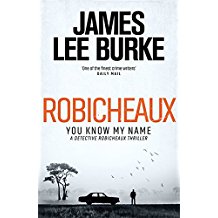
I discovered the stories of Louisiana
policeman Dave Robicheaux around 1991 and the first paperback edition of A
Stained White Radiance carried a cover quote (‘Burke is among the best
American writers working today’) from my review in the Daily Telegraph.
But over the years, as I have got older
– and Robicheaux has got much older,
surely far too old for Sherriff’s deputy even in slow-moving Cajun country – I
have found myself becoming more and more appalled by the character’s high and
dubious moral stances and his vicious application of violence in response to
the merest slight. In fact, Dave Robicheaux has turned, for me, from an
oak-solid protector of the weak and innocent battling against a history of
alcoholism into a bit of a bully.
In Robicheaux he sadistically beats up
a suspect (though not suspected of very much except by Robicheaux himself) in a
lavatory. His sidekick, the psychopath Clete Purcell, whom our Dave loves and
regards as ‘a noble mon’, also beats up two hoodlums in a public lavatory, this
being recurring motif in recent books. (In a previous novel, Purcell has
tortured somebody in a lavatory by making them eat urinal disinfectant cakes.) Robicheaux
also very publicly threatens an ailing gangster – who breathes via a mask and
oxygen cylinder – by ‘dry firing’ an empty revolver into his face because he
has been rude to his daughter Alafair, and then interviews (alone) a married
woman claiming to have been raped and in an unbelievably insensitive manner,
calls her ‘Miss’ so that the victim complains about his ‘Plantation manners’.
(Robicheaux is big on Confederate social niceties.)
But it seems that Dave Robicheaux,
despite himself being prime suspect in a murder case as the book begins (though
no one seems to care much in the police department), can get away with such
behaviour as long as he goes to his AA meetings and Mass once a week. He does
actually fall off the wagon a couple of times in this book, but mostly makes a
point of only drinking ‘Dr Pepper’ – and there are so many references to it
that the reader begins to suspect product placement.
I have long had misgivings about how
much licence Robicheaux gives his friend Clete Purcell (an ex-cop with a
curious taste in hats) to help in his investigations, often committing more
violent crimes than the villains being pursued. Robicheaux somehow justifies
such awful behaviour and indeed seems to encourage it and his fellow officers
in law enforcement turn a blind eye. Yet in Robicheaux there is a new
character, at least in the second half of the book, who is even more of a
violent creature than Purcell and just as badly dressed. This is a mentally-retarded hit man flown in
from Florida to kill off most of the characters in the book and a few
bystanders along the way. With a military-grade arsenal of weapons at his
disposal and a penchant for wearing flamboyant Disney t-shirts and caps, this
smiling killer goes on the rampage across Louisiana, at one point escaping in
an ice-cream truck in broad daylight. Amazingly, he avoids detection by the
cops, who don’t actually seem all that bothered about catching him.
There are plenty of loose ends (and
unsolved murders) which hint at a follow-up novel. If there is one, I’m afraid
I’ll pass, preferring to remember Dave Robicheaux, with all his problems, when
he was clearly one of the good guys.

Given that Robicheaux’s novelist
daughter Alafair appears in the book as a wannabe scriptwriter in a rather
unbelievable moving-making sub-plot, it is interesting that James Lee Burke’s
real daughter, Alafair Burke, has a new novel, The Wife published
here by Faber. Coincidence? Probably.
Is this another Macbeth I see before
me?
Yes; a Hamish Macbeth, that is, from
that most prolific of authors, M.C. Beaton, who I think passed the 100 novels
mark some time ago and is one of the most popular adult authors borrowed from
public libraries.
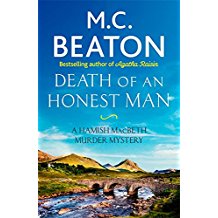
Death of an Honest Man, published this month by Constable, is
the 34th outing for canny Scot policeman Sergeant Hamish Macbeth,
the central character in one of M.C. Beaton’s highly successful series of
mysteries – the other, of course, featuring Agatha Raisin.

I have not seen Marion for some years
now, but I can honestly attest to the fact that she is one of the liveliest and
most astute writers to be on a panel with at a crime fiction convention.
|
|
Books of the Month
My book of the month, and I have to say by quite a long chalk, comes from Australia and award-winning author Jane Harper. Force of Nature, published by Little Brown, is a consummate piece of mystery writing, cleverly plotted with three-dimensional characters and a neat twist on the traditional ‘whodunit?’ trope of a closed-circle of suspects, the circle here not being confined to an English country house or an island cut off from civilisation at high tide, but rather the great Australian outback.
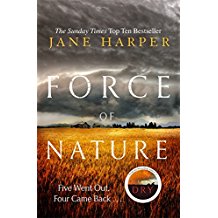
In fact the wide, wild Australian ‘bush’ turns out to be a rather claustrophobic – and very dangerous – place, at least for two teams of company executives hiking through the rugged landscape on a ‘team building retreat’, the sort of exercise thought up by sadistic Human Resources persons.
Of the female team, five women reluctantly play the corporate game and set off on a three-day hike through the wilderness, but only four emerge at the agreed rendezvous. What happened to the fifth, Alice Russell, who just happens to be in the process of whistle-blowing on the malpractices of her company to the Federal police?
The search for Alice and what actually happened on that trek – which turned out to be anything but a bonding experience for those on it – form interspersed narratives, both of which show the author’s expert grasp of plot and pace and which eventually meet in a satisfying conclusion
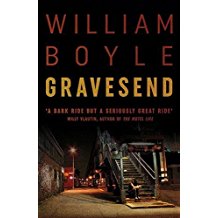
When I heard that No Exit Press were to publish a crime novel titled Gravesend, I wondered momentarily what dastardly events had been going down in that gem of the county of Kent, famous for being the place of the unexplained death and burial of Pochahontas. Of course, I was on totally the wrong track as William Boyle’s debut novel refers to the Gravesend that is a somewhat rough neighbourhood of Brooklyn in New York.
Boyle’s tightly-written piece of urban noir has already been published in France, where it was short-listed for two major awards. I am not in the least surprised that the French loved it, for this tale of broken families, loss, revenge and minor criminality is firmly in the tradition of noir writing. (If only the French had a word for noir…)
In terms of getting under the skin of the lower orders of American society, this is ground which Dennis Lehane, George Pelecanos and Jason Starr have successfully mined already, but William Boyle has his own, fresh, voice to bring to the party. It’s a voice which, at times, reminded me of the kick I got when I read my first Elmore Leonard.
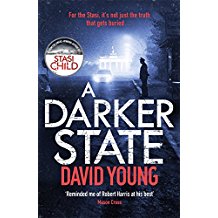
Just about the one remaining memory of the DDR – the German Democratic Republic or ‘East Germany’ – outside of the history books is the Stasi, its infamous secret police so beloved by the writers of spy fiction at one time.
I never had the chance to visit East Germany while it existed. The nearest I got was a tasting of East German beers (in a West German brewery) and being sent a postcard depicting a modernistic desk ornament by veteran thriller writer Alan Williams, who actually fell foul of the Stasi whilst a journalist in the late 1950s.

However, crime fiction has a new heroine in the form of Karin Müller, a major in the People’s Police, as created by David Young in his award-winning historical mystery Stasi Child. Now Karin Müller returns in A Darker State, published by Zaffre.
This will not be the only mention of the Stasi in this column, but it is the one to be taken seriously.

I met Walter Mosley in 1991 when he, I, Ruth Rendell and Frances Fyfield were all up for awards from the Crime Writers’ Association. Oh, happy days … but long before the advent of mobile phones or digital photography (I am told there are telephones which can take pictures these days) and so there is absolutely no record of the event on ‘social media’ - whatever that is.
Famous for his Easy Rawlins series of crime novels, Walter has experimented with other series characters such a Socrates Fortlow and Fearless Jones, and now introduces a new one, New York police detective-turned-private-eye Joe ‘King’ Oliver (one for the jazz fans there) in Down the River Unto the Sea from Weidenfeld and Nicolson.
I am looking forward to renewing my
acquaintance with his work, having somehow lost touch with his more recent
output since his rather disturbing ‘sexistentialist’ (his word for
pornographic) novel Killing Johnny Fry.
Book of Next Month
I am already enjoying what I feel sure
will be my book of the month in March: That Old Black Magic by Cathi
Unsworth, to be published by Serpent’s Tail.
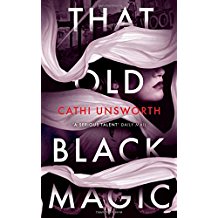
A 1943 wartime setting, spiritualism,
witchcraft and espionage – what is possibly not to like? Especially when Cathi
Unsworth has shown such skill in conjuring up that period and populating it
with fantastical, yet credible, characters before. I would go so far as to say
that when imagining Britain, and particularly London, in the smoke-stained drab
and dusty days of the 1940s and 1950s (and many have tried), Cathi Unsworth and
Elizabeth Wilson are the current leaders in the field.
TV Times
Having been confined to quarters here at Ripster Hall for several months I have resorted, in order to break the monotony of new crime novels with ‘Girl’ in the title or books which come blurbed with the words ‘How far would you go?’, to watching television, albeit selectively.
I am more convinced than ever that the French policier Engrenages or Spiral as it is known on BBC4 (who knew there was a BBC 4?), now in its sixth series, is one of the best TV crime dramas ever.

Intricately plotted and not afraid to tackle sensitive issues (drugs, urban depredation, illegal immigrants, people trafficking, ‘no-go’ areas such as Romany encampments, dodgy cops and shady lawyers), with high production values and superb acting, I have been a fan for several years and find myself genuinely worried for the future of some of the characters. And I know it’s fiction.
What I hope is fiction, but probably isn’t, is the brilliant Italian epic Gomorrah, an everyday story of mafia families in modern day Naples. (Actually, it’s the mafia in Sicily, the camorra in Naples and the ’ndrangheta in Calabria, and now, Umbria.)

A third series – despite the carnage at the end of the second series – is now out and has already caused a stir in Italy with record viewing figures. It’s fast, cynical and very violent and played entirely from the gangsters’ point-of-view with not a policeman in sight.
A world away from Death in Paradise or Midsomer Murders, this is television crime drama at its most brutal and bloody, and totally riveting.
Spy Guys and Gals
Never one to be cowed, or remotely
influenced, by political correctness, the ‘podcast’ (whatever that is) provider
Spybrary, which is an excellent
resource for lovers of spy fiction, has utilised former members of East Germany’s
Stasi in its current advertising campaign.

I mention this in passing only because I am in trouble with some of the followers of the Spybrary podcasts who seem to have taken my history of the boom time in British thrillers, Kiss Kiss Bang Bang, as a bespoke shopping list. I am told that bank accounts have been drained, college funds raided and divorce proceedings instigated as second-hand bookshops across America are being stripped of fifty-year-old thrillers by readers following my recommendations.
There has even been a picture posted on Snap Tube or You Chat or whatever it’s called showing my modest volume and a pile of books one reader has already splashed out on.
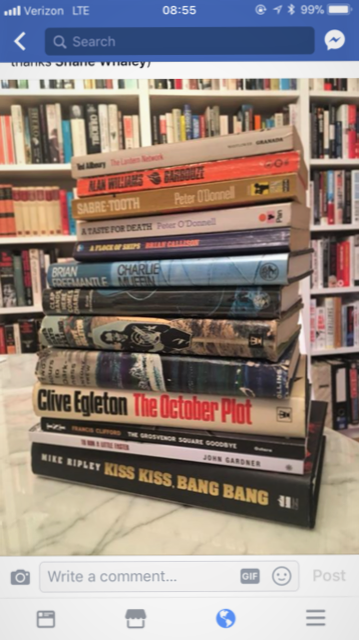
I have to admit to a frisson of pride to see Francis Clifford’s The Grosvenor Square Goodbye, which I actually brought back into print as a Top Notch Thriller, on the pile especially as it concerns the vulnerability to a lone terrorist of the old American Embassy in London. Now there’s a new American Embassy it will be interesting to see if a present-day thriller writer can come up with a book as good as Clifford’s 1974 award-winner.
Toodles!
The Ripster
|